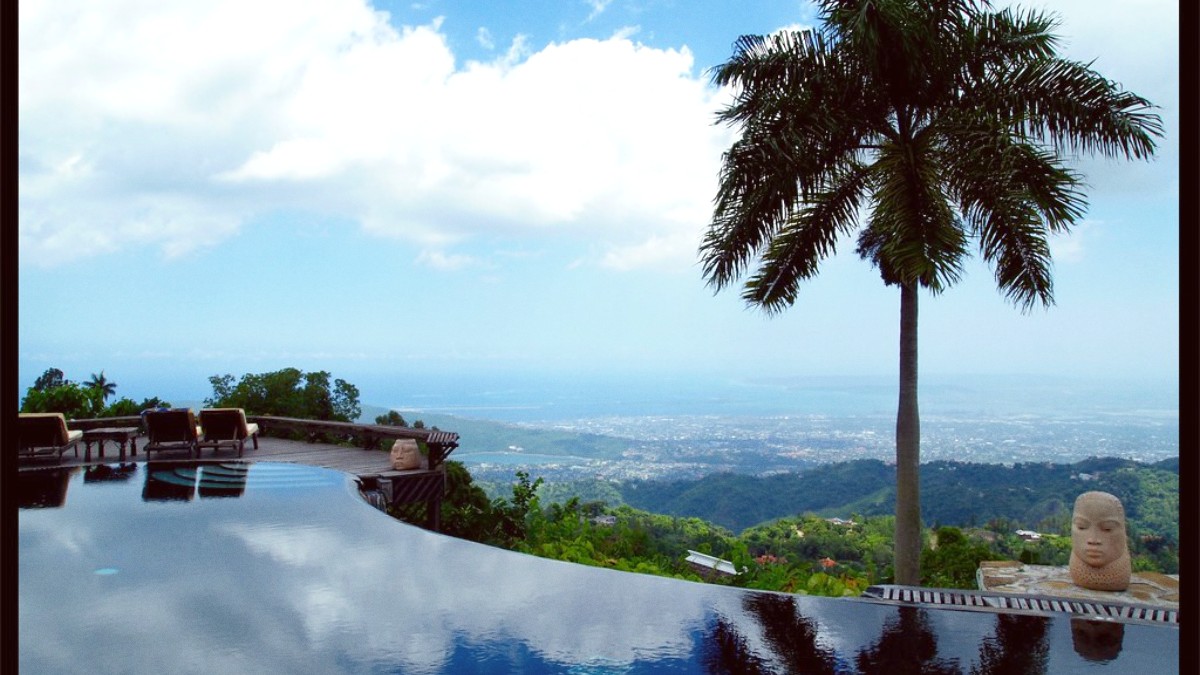
Jamaica
Kingston generally holds warm temperatures, typically between 26°C and 30°C (79-86°F) all year. The tropical conditions mean humidity often stays high, commonly over 70%. Rainfall patterns divide the year. The main rainy periods occur from May to June and again from September to November. During these times, rain often appears as short, heavy afternoon downpours. These can be intense but seldom last all day, frequently giving way to sunshine.
The driest months are generally December to April and July to August, with more consistent clear skies. Travelers visiting during hurricane season (June to November, peak August-October) should monitor weather forecasts.
Kingston falls within the Atlantic hurricane belt. Peak activity occurs from August to October. Travelers planning visits during these months track weather forecasts closely.
Heavy tropical downpours can occur, possibly leading to localized flooding. This impacts road conditions and transportation, especially during the rainy periods.
Highest from August to October.
Regularly monitor official weather advisories.
Heavy rains can lead to localized flooding.
May-June, Nov-mid-Dec.
More relaxed atmosphere, better value.
Occasional, often brief, rainfall.
Mid-December to April.
Optimal for outdoor activities and city exploration.
Expect increased prices for flights and lodging.
Consider your objectives. If avoiding rain and enjoying sunny outdoor activities stand high on your list, aim for the high season. For budget savings and fewer crowds, the shoulder or low season may suit you, with an awareness of the weather risks.
December to April is optimal for beach and water activities, offering great sunshine and calmer seas. For hiking and outdoor exploration, this period avoids high humidity and heavy rains, making trails more comfortable and views clearer. Many cultural events occur year-round, but visiting during shoulder or low season can present better value for event attendance and a more immersive experience with local festivities, as tourist numbers are smaller.
Best for consistent sun. Higher costs, more people.
Good balance. Some rain, moderate crowds.
Budget-friendly. High heat, hurricane risk.
December-April. Clearer views, more comfortable.
Shoulder/Low Season. Good event value, local immersion.
Entry requirements change by nationality. Confirm the specific rules for your passport before booking travel.
Many countries have visa-free access for tourist visits to Jamaica. This makes entry straightforward for numerous travelers.
Make sure you carry all necessary documents to avoid delays at immigration.
Jamaica uses its own currency, the Jamaican Dollar (JMD). U.S. Dollars (USD) are widely accepted, especially in tourist areas. Plan your budget based on your travel style.
These daily cost estimates are for a single traveler and can change based on choices and current economic conditions.
Budget Traveler (Daily: $50 - $100 USD)
Accommodation: Around $20-$40 for a hostel dorm or basic guesthouse. Communal kitchens can lower food costs.
Meals: Focus on local street food and "cook shops," budget $15-$30 per day for hearty meals like patties or jerk chicken.
Transportation: Rely on public buses (JUTC) and shared route taxis, very affordable ($5-$10 per day for multiple city trips).
Activities: Free or low-cost attractions like Emancipation Park, National Gallery, exploring neighborhoods on foot. Allow $10-$20 for occasional paid entry.
Mid-range Traveler (Daily: $100 - $250 USD)
Accommodation: Comfortable mid-range hotel or well-regarded guesthouse, $60-$120 per night. Often with private bathrooms.
Meals: Mix of local restaurants and some higher-end dining, budget $30-$70 per day for various Jamaican dishes.
Transportation: Ride-sharing apps (InDriver), chartered taxis for comfort, occasional public transport. Budget $15-$30 daily.
Activities: Paid attractions like Bob Marley Museum, Devon House tours, possibly an organized day trip. Allow $20-$50 for activities.
A cost-conscious approach, focusing on affordable lodging, local eateries, and public transport. Offers a deep dive into local life without high expenses.
Hostel dorms, street food, JUTC buses.
High-end dining, private tours.
A balance of comfort and value, with nice hotels, varied dining, and some convenient transport. Allows for a broader experience.
Guesthouses, local restaurants, ride-sharing.
Extremely high-end hotels, exclusive services.
Prioritizing premium services, top-tier accommodation, and exclusive experiences. Unrestricted by budget for a high-comfort trip.
Boutique hotels, fine dining, private transfers.
Cutting corners, self-catering options.
| Category | Type | Price (USD) |
|---|---|---|
| Accommodation | Hostel Dorm Bed | $20-$40 |
| Accommodation | Mid-range Hotel/Guesthouse | $60-$120 |
| Meals | Local street food/patty | $1.50-$5 |
Consult a travel health professional well before your trip to discuss vaccinations. Your well-being remains a top priority.
If from or transiting through Yellow Fever risk countries.
For food/waterborne diseases.
For food/waterborne diseases.
Mosquito-borne illnesses like Dengue and Chikungunya are present.
Use Insect repellent with DEET (30%+) or Picaridin. Wear long sleeves and pants, especially at dawn/dusk. Consider sleeping under a Mosquito net if no AC.
Traveler's Diarrhea: Practice rigorous food and water hygiene. Wash hands often, use Hand sanitizer. Consume thoroughly cooked food. Peel fruits yourself. Sunburn/Heatstroke: Apply High-SPF, broad-spectrum sunscreen (min SPF 30), wear a Wide-brimmed hat, and stay hydrated with Bottled water. Seek shade midday.
Access to Healthcare: Public and private hospitals in Kingston. Dial 119 for emergencies.
Exercise caution in certain downtown areas (Parade, Tivoli Gardens, Trench Town, Waterhouse) after dark. Day visits recommended as part of organized, guided tours.
New Kingston, Liguanea, Constant Spring, Barbican are generally safer. Petty crime like pickpocketing can occur anywhere; stay watchful.
Avoid walking alone at night. Do not display expensive valuables openly. Use reputable taxis or ride-sharing services. Be aware of your surroundings; trust your instincts. If a situation feels unsafe, remove yourself.
Jamaica is in an active seismic zone; minor tremors occur. The main natural disaster risk is hurricanes.
It is highly suggested to purchase comprehensive travel insurance.
A good policy covers medical emergencies, emergency evacuation, trip cancellation, and lost or stolen luggage. Ensure coverage for planned activities.
Police, Fire, Ambulance: Dial 119. Local assistance: Contact your embassy/consulate in Kingston for passport loss, legal aid, or difficulties.
U.S. Embassy: (876) 702-6000. Canadian High Commission: (876) 926-1500. British High Commission: +1 876 510 0700. Keep these numbers accessible.